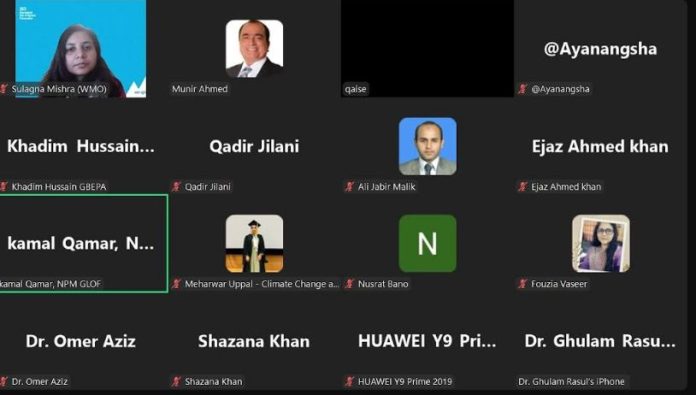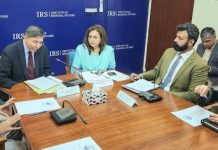DNA
Islamabad – At a sideline event of the International Year of Glaciers Preservation (IYGP), organised by the Devcom-Pakistan (Development Communications Network) on Tuesday the panel of experts underscored the urgent need for decisive and collaborative actions to address the challenges posed by glacial melt and glacial lake outburst floods (GLOFs) in Pakistan. Highlighting the critical state of the country’s glaciers and the cascading risks to downstream communities, they proposed a series of strategies to chart the way forward for glacier preservation and improved GLOF management, and by reducing the human interventions such as tourism, deforestation and housing and recreation structures.
The panel emphasized the importance of expanding glacier monitoring networks through the deployment of advanced technologies, such as drones, satellite imagery, and automatic weather stations. These tools, they noted, are essential to track glacial changes in real-time and inform evidence-based decision-making.
To safeguard ecosystems in glacier-fed regions, the experts advocated for large-scale afforestation projects aimed at stabilizing fragile landscapes and regulating water flows. Such initiatives, they suggested, would not only mitigate environmental degradation but also contribute to climate resilience.
The reduction of black carbon emissions emerged as a priority, with the panel calling for stricter regulations on polluting industries and the promotion of clean energy alternatives in mountain communities. They noted that black carbon accelerates glacier melt by darkening ice surfaces and increasing heat absorption.
Strengthening community resilience was identified as another key pillar for sustainable adaptation. The panel recommended scaling up disaster preparedness programs and awareness campaigns in vulnerable areas to equip local populations with the knowledge and tools needed to mitigate GLOF risks.
Lastly, the experts stressed the urgency of securing climate finance to support glacier preservation efforts. They urged international stakeholders to provide sustained funding for conservation projects and adaptation measures, recognizing that protecting glaciers is not just a regional concern but a global imperative.
By implementing these strategies, the panelists affirmed, Pakistan could better preserve its vital glaciers, protect vulnerable communities, and contribute to global efforts to combat climate change.
The International Year of Glaciers Preservation (IYGP) was officially launched in a hybrid event organized by UNESCO and the World Meteorological Organization (WMO) on Tuesday, January 21, 2025. The launch event, held in Geneva, saw global participation with over 50 sideline events organized worldwide, including the one and only notable webinar by Devcom-Pakistan titled “GLOF Management in Pakistan: The Lessons Learnt and the Way Forward.”
The Devcom-Pakistan webinar brought together a distinguished high-level panel of experts from Pakistan’s mountain regions, including present and former National Project Managers of the UNDP-GoP GLOF projects, Kamaluddin Qamar and Khalil Ahmed, along with leading environmentalists and policy experts. They included Dr. Ghulam Rasool former Director General of the Pakistan Meteorological Department, Gilgit-Baltistan EPA Director Khadim Hussain Nowgam, Ali Jabir Malik, Ejaz Ahmed, Somayya Irum, Nusrat Bano, Altaf Hussain, Fareed Anwar, Saviba Naeem, Meharwar Uppal, Fouzia Vaser, Qadir Jilani, Dr Omar Aziz and others.
The webinar also featured remarks from Dr. Sulagna Mishra, Scientific Officer at WMO, who elaborated on the importance of the International Year of Glaciers Preservation. “This year marks a pivotal moment for global efforts to protect glaciers, which are not just a source of freshwater but also play a critical role in regulating the planet’s climate. The task forces and initiatives launched under IYGP will focus on enhancing research, capacity-building, and cross-border collaboration,” Dr. Mishra said. She further announced that the IYGP would include a series of research studies, public awareness campaigns, and policy advocacy events, culminating in a Global Glacier Summit in December 2025.
The National Project Manager of the GLOF-II Kamaluddin Qamarshared key measures implemented to reduce the risks associated with glacial lake outbursts. These measures he said included installation of early warning systems in vulnerable areas, community-based disaster preparedness training programs, construction of flood protection walls and drainage channels to mitigate the impact of sudden floods, development of hazard maps to identify at-risk glacial lakes. He highlighted the significant progress made in building resilience among the affected communities and improving response mechanisms. However, they also emphasized the need for sustainable funding and expansion of these initiatives to other regions with similar vulnerabilities.
During the webinar, Munir Ahmed, Executive Director of Devcom-Pakistan, presented a comprehensive overview of the state of glaciers in Pakistan. He noted that the country, home to over 13,000 glaciers, is experiencing rapid glacial melt due to rising temperatures, black carbon deposition, and unsustainable human activities. “Glaciers are the lifeline of Pakistan’s water resources, feeding the Indus River, which sustains our agriculture and energy sectors. However, the accelerated melting of glaciers poses a severe threat to the livelihoods of millions. Immediate action is required to preserve these glaciers for the future,” Ahmed emphasized. He also pointed out the increasing frequency of GLOFs, which have caused significant loss of lives and property in northern Pakistan.

















